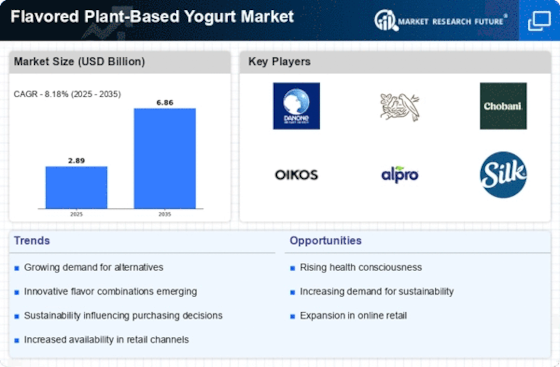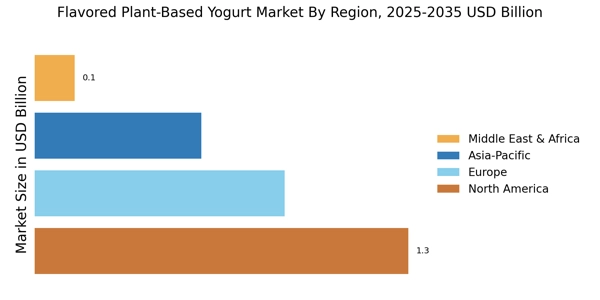Flavor Innovation
Flavor innovation plays a pivotal role in the Flavored Plant-Based Yogurt Market, as manufacturers strive to differentiate their products in a competitive landscape. The introduction of unique and exotic flavors has become a key strategy to attract diverse consumer segments. For instance, flavors such as matcha, hibiscus, and tropical fruits are gaining traction, appealing to adventurous eaters and those seeking novel taste experiences. Market data indicates that flavored plant-based yogurts are projected to account for over 60% of total plant-based yogurt sales by 2026. This trend suggests that companies investing in flavor development are likely to capture a larger market share, as consumers increasingly seek products that not only meet their dietary preferences but also excite their palates.
Sustainability Focus
Sustainability is a driving force in the Flavored Plant-Based Yogurt Market, as consumers become more environmentally conscious. The shift towards plant-based diets is often motivated by concerns over animal welfare and the ecological impact of dairy farming. As a result, brands are emphasizing sustainable sourcing and production practices, which resonate with eco-aware consumers. Recent studies indicate that plant-based yogurts typically have a lower carbon footprint compared to traditional dairy products, making them an attractive option for environmentally conscious buyers. This focus on sustainability is likely to enhance brand loyalty and consumer trust, as companies that prioritize eco-friendly practices may stand out in the increasingly crowded Flavored Plant-Based Yogurt Market.
Health-Conscious Choices
The Flavored Plant-Based Yogurt Market is experiencing a notable shift towards health-conscious consumer behavior. As individuals increasingly prioritize their well-being, the demand for nutritious alternatives to traditional dairy products has surged. This trend is reflected in the growing popularity of plant-based yogurts, which are often lower in calories and saturated fats compared to their dairy counterparts. According to recent data, the plant-based yogurt segment has seen a compound annual growth rate of approximately 20% over the past few years. This growth is driven by consumers seeking products that align with their health goals, such as weight management and improved digestive health. Consequently, brands are innovating to offer yogurts enriched with probiotics, vitamins, and minerals, further enhancing their appeal in the Flavored Plant-Based Yogurt Market.
Diverse Dietary Preferences
The Flavored Plant-Based Yogurt Market is significantly influenced by the rise of diverse dietary preferences, including veganism, lactose intolerance, and gluten-free diets. As more individuals adopt plant-based lifestyles or seek alternatives due to dietary restrictions, the demand for flavored plant-based yogurts continues to grow. This trend is supported by data showing that approximately 30% of consumers are actively seeking dairy-free options, highlighting a substantial market opportunity. Brands are responding by expanding their product lines to cater to various dietary needs, ensuring that consumers have access to flavorful and satisfying yogurt alternatives. This adaptability is crucial for companies aiming to thrive in the evolving Flavored Plant-Based Yogurt Market.
Increased Availability and Accessibility
The Flavored Plant-Based Yogurt Market is benefiting from increased availability and accessibility of products across various retail channels. As consumer interest in plant-based diets rises, retailers are expanding their offerings to include a wider range of flavored plant-based yogurts. This trend is evident in supermarkets, health food stores, and online platforms, where consumers can easily find diverse options. Market analysis suggests that the expansion of distribution channels has contributed to a significant increase in sales, with plant-based yogurt sales projected to reach $1 billion by 2027. This enhanced accessibility not only meets consumer demand but also encourages trial and adoption, further propelling growth in the Flavored Plant-Based Yogurt Market.

















